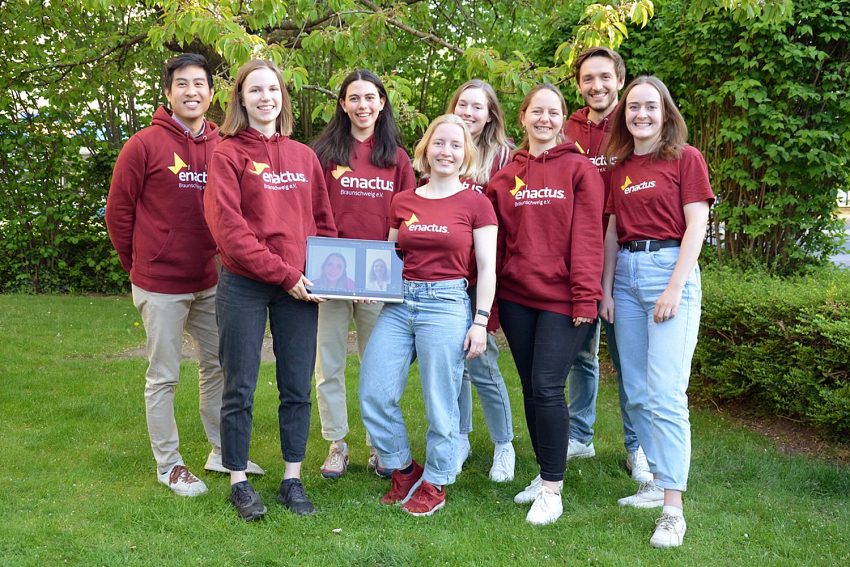“Leb dich grün” – Live green Beatriz Garcia Minguez on saving energy with stickers and "nudging"
Making small changes in everyday life to achieve more sustainability – that’s what the Enactus project “Leb dich grün” (Live Green) wants to do. To achieve this, they design stickers and hang them up in university buildings. For the second part of our series on “Saving Energy at TU Braunschweig”, Mark Winter met with Beatriz Garcia Minguez, a team member at Enactus, and asked her questions about saving energy as a student.

Beatriz Garcia Minguez (third from left) and the Enactus project “Leb dich grün” (Live Green) want to encourage sustainable behaviour with stickers. Photo credit: Enactus/TU Braunschweig
Hello Beatriz, can you briefly introduce yourself and the “Leb dich grün” project?
I study industrial engineering and am part of the “Leb dich grün” team. This is a project within the student initiative Enactus Braunschweig e.V. Enactus is about getting involved with sustainable and social projects. The aim is for the projects to eventually become self-sustaining. In the “Leb dich grün” project, we are a team of twelve students from a wide range of subjects. We deal with sustainable and resource-saving behaviour and want to make people aware of this. We have noticed that too much is consumed in everyday life and therefore want to make people think – without saying that everyone’s consumption is fundamentally bad and harmful to the environment. We want to do this in a positive and fun way and show how you can change individual actions in everyday life to live more sustainably and environmentally friendly.
What are the actions you want to change?
It all started with our stickers. We originally chose the theme “paper towels”. You only use them once and then throw them away. It would make a big difference if everyone used only one or two towels instead of a handful. If you extrapolate this personal saving to 1000 people, there is a big saving here – not only for the environment, but also financially for the university.
Are these the only stickers you designed?
No, those were just the first stickers we produced and put up. They were actually very successful. After that, we sat down together as a team and thought about what other topics we could address with stickers. Then we produced the second and third stickers with the message “Du gehst raus? Licht aus!” [You’re going out? Lights out!] and “Am besten digital angucken, sonst beidseitig drucken!” [It’s best to look at it digitally, otherwise print it on both sides!] This is about electricity and paper consumption respectively. We are also currently planning a heating sticker.

“Start Small, Create Change” – changing small actions in everyday life – that is the idea behind the “Leb dich Grün” stickers. Picture credits: Enactus/TU Braunschweig
How do you identify the places where you put the stickers?
In the beginning, with the paper towel sticker, it was clearly in toilets and bathrooms. They’re usually stuck above the paper bin, so you can’t miss them. We haven’t distributed the “lights out” sticker yet because that was only designed during the covid pandemic. However, I have already stuck a small number of these stickers privately. For example, I asked my internship place if I could hang some up there and then placed them right next to some light switches near the door.
Why stickers? What is the idea behind it?
The reason why we chose stickers is because they are eye-catching, simple to produce and can give short recommendations for action in places where energy and resources are consumed. We work here with short and simple messages that, in the best case, even rhyme. “Du gehst raus? Licht aus!” – that sounds melodic and stays in your head. We rely on psychological approaches such as “nudging”. The stickers are meant to encourage people to rethink their behaviour.
What is the feedback on the stickers like?
The feedback is measurably positive. Following the test phase of our first sticker, TU Braunschweig found that it had saved two million paper towels in one year. Of course, we hope for a similarly positive effect with our next stickers.
What other projects does Enactus have beyond that?
We have numerous projects that focus on either environmental or social issues. One environmental project, for example, is “Pflanzen auf Achse” [Plants on the Move], in which we are developing a sensor-controlled irrigation system for plants. A project with a more social focus is “FairFolgen” [Follow Fairly]: This is a sustainable city rally for pupils through Braunschweig, which introduces them to different aspects of sustainability at various stations via quizzes, audio input, etc. It is important to start talking about the topic of sustainability early on in education so that children learn energy and resource-saving behaviour and develop routines.
How can you save energy as a student at TU? What are your tips?
There are many possibilities! It already starts on the way to the university. If possible, you should avoid using your car and use public transport or, even better, a bicycle. Of course, it also helps to use fewer paper towels. If you are the last person in a room, you should make sure that the lights, projector etc. are switched off. At lunchtime, you should only get food from the cafeteria that you will actually eat, to prevent food waste. The best thing about more sustainable behaviour is that it often pays off twice financially. Not only does it save the university money, but everyone saves money personally too. If you can’t convince people with the environment, money often convinces them.
Thank you very much for the interview.
